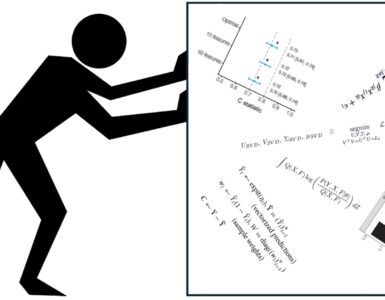Writing a master’s thesis can be daunting – it’s like driving towards the fog without knowing what’s waiting for you. You might not even know how to start and realize that you’ll spend half a year to a year of your time on this work. You want to write a good thesis, but you don’t want to lose yourself in the process. With this blog post, I want to help clear some of that fog for you by sharing my five pillars of enjoying the process of writing your master’s thesis.
1. Choose your topic with care
Choosing a topic for your master’s thesis can be one of the most challenging aspects of the process. With so much freedom to choose, it’s important to select a topic that will allow you to get the most out of your year-long project. Mid 2019, as a neo-statistician, I wanted to find a topic that would help me orient myself for what comes after my thesis while also improving my statistical knowledge and receiving proper supervision. After months of consideration, I decided on a project that investigates how to solve misclassifications in aggregate statistics.
2. Find the right environment
I was fortunate enough to hear about the EMOS program, an extra certificate in my master’s program that allowed me to learn more about official statistics and write my thesis at CBS, the Dutch national statistical institute. Although I missed the application deadline by a few months, I was able to shuffle the order of my courses and start in February. Despite this minor setback, I was still faced with the challenge of choosing a project. After speaking with the coordinator, I ultimately decided on the misclassification project.
After an introductory meeting with my supervisors in February 2020, I was ready to start my project. I was initially concerned about where to begin since there were many ways to tackle the research questions. Fortunately, my supervisors were able to guide me through the process. They provided some ideas to get me started, which I was able to expand upon. Within a few weeks, we had a good idea of where the thesis was headed.
In addition to their guidance, I also appreciated the working environment. I was able to work alongside other interns who were also following the EMOS program. Writing a thesis can be isolating work, but having others around definitely helped me stay motivated.
3. Keep your work-life balance healthy
However, in March 2020, like many others, I had to change my working environment from the office to my bedroom. While this came with its own set of challenges, CBS was able to set up a proper remote office in no time. I had to adjust to the fact that I could no longer ask questions in real-time and learn to work more independently. Personally, it was quite tough for me to work from home. Even as a student, I preferred to separate my work and private life and that hasn’t changed since then. However, with some creative solutions – like reading articles on the beach – we were able to move forward!
4. Celebrate your accomplishments
Halfway through my thesis, I realized that things were going well. I enjoyed doing research, especially deriving mathematical proofs in combination with statistical modeling. Step by step, getting closer to the bigger picture was awesome, but it was also something to get used to. In your final results, you only see one formula, but it took weeks of iterative work to get to that point. It was the first time for me to work on such a long project, and I would advise others to celebrate these minor accomplishments along the way. It can be easy to get bogged down in the details and forget how far you’ve come! Writing your thesis is more than just the 50 pages that end up in your final version.
5. Say out loud where you want to go next
During a meeting with my supervisors, I mentioned that I was considering pursuing a PhD after my thesis. We decided to write a conference article based on our work so far. This experience was really valuable for me! I discovered what I liked about research (modelling) and what I needed to improve (scientific writing). The moment that I heard that our paper was accepted was really great – it’s one of my major accomplishments so far and something that I’m really proud of. It also helped me to set a proper basis for the final thesis and extend it into the final product.
Throughout the year, I learned that you should say out loud what you want. If no one knows what you find important in finding a good thesis, no one can help you. If no one knows that you want to pursue a PhD, no one can help you. If you want to improve your writing and promote your research, start blogging! I’m really lucky that I received help from amazing people, but I also realized that you have to take action before you can get into a place where you can get lucky. And most importantly, you’re not alone!
Main image: Linnaea Mallette on PublicDomainPictures.net














Add comment